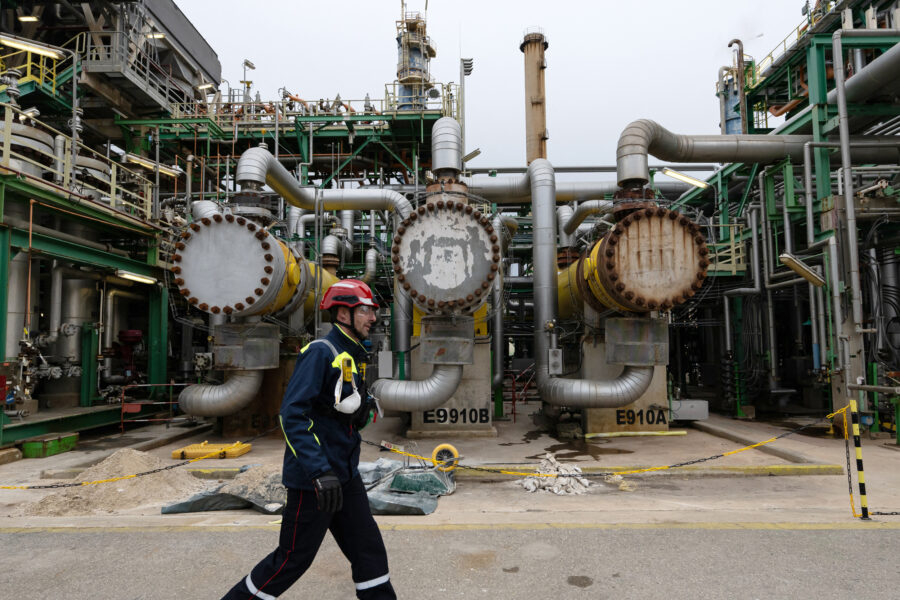Royal Dutch Shell said on Thursday it will sell nearly all of its tar sands assets, the latest sign that operations in the Canadian resource continue to struggle as oil prices remain historically low and energy companies come under increasing pressure to reduce their impacts on climate change. The sale, to Canadian Natural Resources Limited, is one of the biggest in a series of steps by multinational companies to turn away from the tar sands, among the most expensive and carbon-intensive sources of oil.
“You’re seeing this real accelerating pull out by the industry from what was once the crown jewel of oil projects, so it’s a big deal,” said Andrew Logan, director of the oil and gas program at Ceres, a nonprofit that promotes sustainable investing. “I think it’s a tipping point for the oil sands as an investible resource.”
For Shell, it’s part of a shift toward operations with lower costs and a lower carbon footprint. The company also disclosed details of a new policy to tie 10 percent of annual bonuses to management of greenhouse gas emissions from its operations.
The $7.25 billion deal covers all of Shell’s 2 billion barrels of tar sands reserves, and will be used to help pay off debt acquired after the company bought a major player in liquefied natural gas last year. “This announcement is a significant step in reshaping Shell’s portfolio in line with our long-term strategy,” Chief Executive Ben van Beurden said in a statement. He said the company will focus on projects with higher returns and areas where Shell has a competitive advantage, including natural gas and deep-water drilling.
While the sale will move Shell out of the business of operating oil sands projects, the company will continue to hold a substantial stake in the resource. Part of the deal includes a transfer to Shell of $3.1 billion worth of shares in Canadian Natural Resources. Shell will also continue to operate a facility that upgrades tar sands into crude oil and a project that captures carbon emissions from some of its tar sands operations.
The announcement comes just weeks after Exxon disclosed that had reduced its oil sands reserves estimate by 3.5 billion barrels, an acknowledgement that its newest Kearl project is not currently economical. Unlike Shell, however, Exxon said it will continue to operate Kearl and all of its oil sands projects. ConocoPhillips also recently reduced its reserves, by more than 1 billion barrels.
“It continues a trend of consolidation of oil sands interests into the hands of the largest Canadian companies,” said Michael Dunn, an analyst with GMP FirstEnergy.
Logan said the exit of multinationals—with Exxon as a notable exception—will mean oil sands operations will have less access to capital from investors.
While the Shell deal represents a major hit for the oil sands, it hardly comes as a surprise, said Simon Dyer, Alberta director at the Pembina Institute, a Canadian research and advocacy group. “I think it does send a signal that you’ve been seeing in the oil sands for the past couple of years,” he said. The combination of high costs, low oil prices and a growing sense that governments will begin regulating carbon emissions has made many investors turn away from oil sands, Dyer said. “Those things together send a pretty strong signal.”
Kevin Birn, an analyst with IHS Energy, said the Shell deal is another sign that oil sands growth will continue to be sluggish. Multinationals are putting their money elsewhere, he said, leaving fewer companies willing to invest.
About This Story
Perhaps you noticed: This story, like all the news we publish, is free to read. That’s because Inside Climate News is a 501c3 nonprofit organization. We do not charge a subscription fee, lock our news behind a paywall, or clutter our website with ads. We make our news on climate and the environment freely available to you and anyone who wants it.
That’s not all. We also share our news for free with scores of other media organizations around the country. Many of them can’t afford to do environmental journalism of their own. We’ve built bureaus from coast to coast to report local stories, collaborate with local newsrooms and co-publish articles so that this vital work is shared as widely as possible.
Two of us launched ICN in 2007. Six years later we earned a Pulitzer Prize for National Reporting, and now we run the oldest and largest dedicated climate newsroom in the nation. We tell the story in all its complexity. We hold polluters accountable. We expose environmental injustice. We debunk misinformation. We scrutinize solutions and inspire action.
Donations from readers like you fund every aspect of what we do. If you don’t already, will you support our ongoing work, our reporting on the biggest crisis facing our planet, and help us reach even more readers in more places?
Please take a moment to make a tax-deductible donation. Every one of them makes a difference.
Thank you,














